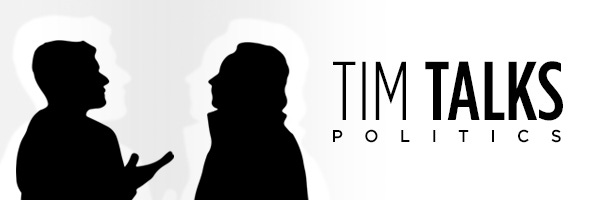Tim Talks Politics - The Weekly Brief, April 20, 2018

The Weekly Brief - April 20, 2018
Changing the guard in Cuba
This last week the global discussion on the future of democracy received a new case study in the form of Cuba. Raul Castro, brother of Fidel, officially handed over power to Miguel Diaz-Canel as the new president.
Speculation quickly arose as to the democratic future of Cuba, with most commentators assuming that Cuba would remain firmly communist. It's not a hard conclusion to draw given America’s general skepticism regarding democracy’s global future.
Every dollar counts
The Congressional Budget Office their budget and economic projections for the next 10 years.The good news is tax projections indicate a flatline, but the bad news is that there seems to be a widening of deficits.
If you want to know where all that money is going, the Daily Signal provides a helpful graphic on what happens to every tax dollar. And in a moment of bipartisan agreement, the conservative Daily Signal supports Senator Elizabeth Warren's proposal for investor consumer protection.
Cryptocurrency and future economies
While Congress is busy making budget projections for the future, futurists are busy making projections about what that future economy will even look like. For the United States, a big part of that picture is cryptocurrencies.
Brookings reports on how individual US states are accounting for the use of cryptocurrencies in economic and tax policy. One key experiment that is going to be of interest is the use of blockchain technology as a low-cost banking solution for people in poor countries like Papua New Guinea.
Beyond cryptocurrencies is the ongoing development of technologies like 3D printing. Politico seems to think that you'll be able to make anything you want and that will change the economy forever.
Syria and Hybrid War
Another area of bipartisan agreement in the last week was support for Donald Trump's coordinated strikes with European partners on Syria after yet another chemical attack. The strike was not without its detractors as a debate quickly developed on the legality of the strike.
Lawfare provides a primer on the legal justifications for the action while the Atlantic questions its constitutionality. This tension between constitutional interpretation and legal standards underscores the need for Congress to reassert itself in the conduct of US foreign policy, particularly in the Middle East.
Concern also arose over the outcome of the strikes. The fact that America does not have a clearly articulated strategy on Syria and the greater Middle East still bedevils the Trump administration and opens it to criticism. The American Enterprise Institute argues that the strikes did nothing to signal American strength and resolve which Al-Monitor somewhat corroborates, reporting that Russia's lukewarm response to the strikes suggests their unimportance.
It's easy to play General Armchair on these strikes, and the Carnegie Endowment for International Peace (generally a critic of the Trump administration) empathetically notes that the strikes were a lousy choice in a batch of bad choices. If we’re learning any lessons in Syria it's that America needs to rethink how it understands war and the use of the military. War on the Rocks discusses this concept of hybrid war and provides an excellent think piece on the “embedded assumptions” of the military.
Bonding over bombs
While the good of the strikes on Syria is debatable, in one area the strike certainly appears to have been helpful: European-US relations.
Al-Monitor reports that the joint strike carried out by the US, British and French militaries was a very strong trust-building moment even as European leaders are pushing Trump to stay in the Iran deal. Brookings supports this position, noting that Trump's cooperation with European leaders could very well bolster flagging support for the JCPOA.
The critical dynamic in Europe is always French-German relations and in this particular instance, France's support of military action differed markedly from Germany's ongoing pacifism in the face of global conflicts. So even as French president Emmanuel Macron seeks to build a Europe-wide movement centered around his brand of politics, Germany is being pushed to assume leadership on the economic front even as it maintains a more independent foreign policy.
Syria Spillover (Iran and Israel)
While Syria may have been a relationship moment for Europe and the United States, another set of actors looked at the missile strikes with deep concern. Israel believes that the attack on Syria only heightens the likelihood that Iran will attack Israel and that window of time in which that happens is closing.
This may be because the strike was very limited and did not signal any further commitment of American troops on the ground. The common denominator to European, American and Israeli responses are geopolitical concerns beyond the borders of Syria, and Iran looms large. And this doesn’t even address humanitarian concerns on how to assist refugees in returning and rebuilding post-conflict.
Smart road to China?
Stories come out every week, it seems, on the increasing power of the Chinese economy particularly it's increasing technological capabilities. Asia Times didn't disappoint this week with stories on China's development of smart roads and their 5G infrastructure projects.
However, Brookings Institute suggests that China's efforts to supplant American economic influence in the global economy is still difficult to do. So even as Xi Jinping seeks to develop a vision of Chinese global economic influence, it’s not a straightforward path.
Peninsular peace probabilities
Plans are moving ahead for the Trump-Kim summit in May and anticipation is high on both sides of the Pacific. However, while the world speculates on the meeting between North Korea and America, War on the Rocks reminds us that there is a South Korea-North Korea meeting happening this next week and that's the one that matters.
It matters because a major diplomatic breakthrough here could places limitations on Trump. One of those limitations could be an agreement between the two Korean leaders officially ending the Korean War, which would throw the future of American soldiers on the peninsula into doubt.


